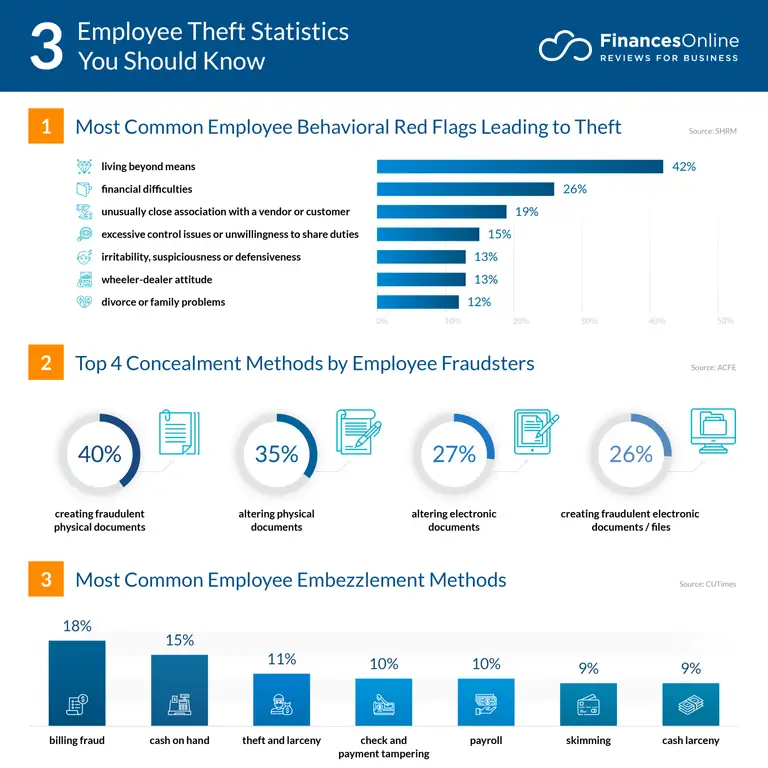Employee time theft is when your employees get paid for time that they didn’t actually spend working.
It can happen in practically any industry, and some cases of time theft may be accidental. For example, since the employee does not know that their actions could be considered time theft. Meanwhile, other cases can be happening with malicious intent, either to unlawfully get more money from the company or because of laziness and poor workplace discipline.
So, how does it happen and how can you stop it? Here are some tips on how to spot when your employees may be stealing company time, and what actions you can take to protect your business. We'll help you uncover different ways employees steal time and what you can do about it as an employer.

Flexible schedule abuse
Having employees with flexible schedules puts your company at risk of schedule abuse. This can happen when the employee claims they worked more hours than they actually did, they use their work hours to do personal things like watching TV, or their work is of a much lower quality than it would be if they were working at the office.
It can be hard to notice at first, especially if your company doesn’t have specific time tracking systems in place and you have to rely on the honesty of your employees.
The biggest giveaway will usually be the quality and quantity of work produced by the employee - if they’re suddenly submitting less work than usual, or the work they produce starts lacking in quality, they may be committing time theft.
Since the whole basis of a flexible schedule is to allow your employees to choose their own hours and work around their personal lives, you can’t just enforce specific clock-in and clock-out hours.
So, the best way to prevent your employees from stealing company time is to invest in high-quality employee schedule management software. This kind of software will automatically track when your employees start working by logging when they sign into the online staff portal, for example.
It will provide you with the exact timings for each workday, making calculating how much your employees really should be getting paid much easier.
Fake clock-ins (buddy punching)
Stealing time at work may seem a bit harder if your employees don’t work from home, but there are still ways they can get away with it.
It’s actually pretty common for employees who are running late for some reason to contact a friend that’s already at work, asking them to punch them in the time clock so that they don’t get in trouble. This is a form of time theft also known as buddy punching.
Buddy punching is understandable if it only happens once or twice (nobody wants to lose a portion of their paycheck or get written up if the lateness genuinely isn’t their fault!). However, if someone does this consistently, then buddy punching is, unfortunately, a case of time theft in the workplace.
Employees may also sometimes stay clocked in during their breaks or after their shift ends. Both are examples of time theft, regardless of whether they’re intentional or not - unless it was previously agreed with a manager that they can do this, the employees could face pay docking, sanctions, or even contract termination, depending on the time theft laws in your local area.
To tackle this, you need to first make sure that your employees are aware of exactly when they start and end their shift, and when they are supposed to go on break and use their personal time.
While this may seem like an incredibly obvious thing every employee should know, some may feel too embarrassed to clarify this information to the employer if they for some reason don’t know it. Stay on the safe side and make sure their time theft isn’t accidental and that your work environment has clear work time rules and guidelines.
If they know all of this and continue to abuse the system, consider investing in better clock in technology. Many companies now use fingerprint scanners instead of codes or cards to ensure that each person can only clock in themselves.
This is an almost failproof way to stop employees from getting away with company time theft, but if they somehow find a way to continue, you’ll have enough basis for sanctions - proper systems were put into place to prevent time theft, therefore only the employee can be charged for misconduct.
Relaxing on the job is also employee time theft
Employees sneaking off to the staff room during working hours or constantly checking their phones while on shift may seem relatively insignificant when compared to the other two types of time theft. However, it's one of the most common ways employees commit time theft at work without knowing it.
Some may not even consider it time theft, though by definition the employees aren’t working all of the hours they’re meant to, which isn’t allowed.
It can be hard to control this behavior since it usually doesn’t involve having to clock in and out - emergencies happen, and expecting your employees to clock out every single time they need to run to the bathroom definitely won’t go down well within the company.
So, what can you do to avoid time theft like this?
The main thing here is communication. Let your employees know that you’re aware of this sort of behavior and that it won’t be tolerated unless it’s a proven emergency, or it’s agreed with a shift manager. Make sure you’re not too harsh at first, since every workplace has different standards, so new employees especially may not yet be aware of your expectations.
If this continues, try speaking with the employees directly. Arrange a meeting with them where you can clearly and calmly explain why their behavior is unacceptable, and what they should do to avoid further sanctions. Explain that as a business owner, you would prefer employees use their break time to take care of personal things.
Be very clear when explaining all of this to make sure the meeting can’t be used against you in the future - being vague about further action or losing your temper won’t help your situation if it ends up escalating.
If the employee still continues to ignore your instructions, proceed with the sanctions you previously warned them about. You’ll need to know the specific time theft laws that exist, both in your local area and your company as a whole.
As with every previous action, make sure the employee clearly understands why they’re being sanctioned or fired to avoid any complications in the future.
This is a common form of time theft that can be prevented by using time and attendance software. Make sure employees know that it constitutes time theft and hurts the business' bottom line.
Wrapping up
As they say, time is money. When employees are stealing time, this is not just a matter of employee theft. It also hurts employee productivity and hurts your bottom line. To prevent employee time theft and time fraud in general, consider using time tracking software such as Unrubble. Time track software monitors time and attendance and creates a time sheet for each employee, making sure they actually work when they are being paid.
Unrubble's time clock software logs employee hours ensures that when time theft occurs, you'll know it by the time card for each employee.





